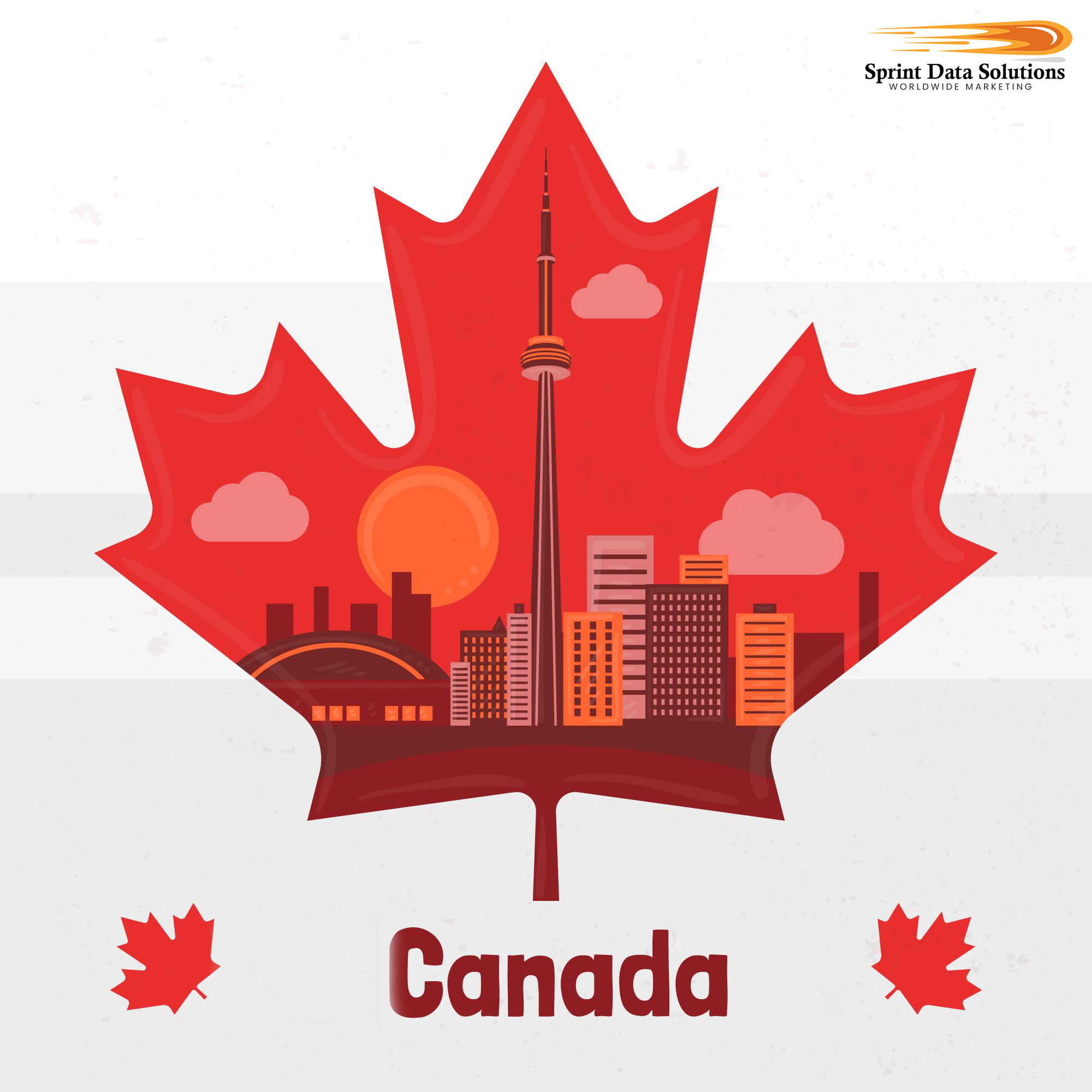Don’t Limit Yourself To Just The USA When There’s A Whole Other Market Up North
When many Americans think of the northern regions, their minds often turn to Alaska, the U.S.’s most northern state. However, there’s an entire neighboring country—Canada—that lies between Alaska and the continental United States. Canada is a vast, diverse nation with its own unique culture, languages, and customs. While its history intertwines with that of the United States, it only formally became a nation in 1867, after its confederation. Despite being distinct in many ways, Canada and the U.S. share much in terms of economic ties, values, and international cooperation.
Today, Canada and the United States are connected by the world’s longest undefended border, which spans over 5,525 miles, fostering a close and peaceful relationship. This proximity has enabled significant collaboration in trade, culture, and security. For businesses in the U.S., Canada offers one of the easiest international markets to penetrate due to the shared language (English being one of Canada’s official languages), similar business practices, and aligned regulatory frameworks.
Furthermore, Canada’s highly developed infrastructure, skilled workforce, and consumer market make it an ideal entry point for U.S. companies looking to expand internationally. Additionally, with strong economic ties, the country offers various opportunities for joint ventures, charity partnerships, and investment. Sprint Data Solutions Worldwide Marketing is fully equipped to assist businesses in navigating the Canadian market, whether you’re looking to establish a presence, develop cross-border relationships, or capitalize on the unique business landscape Canada offers. Whether it’s through targeted marketing, strategic insights, or facilitating entry into Canadian industries, we help you expand your global footprint with confidence.

Why Canada?
For many American businesses and organizations, Canada often stands out as an ideal choice for initial international expansion. There are a multitude of factors contributing to its appeal, making it a logical and strategic first step. Notably, Canada’s geographical proximity to the United States is a significant advantage, facilitating easier logistics and reducing potential barriers related to transportation and time zones. This physical closeness, combined with shared cultural ties, makes the transition to Canadian markets smoother, especially when compared to more distant regions.
Canada also boasts a similar regulatory environment to the U.S., which helps American businesses minimize the risks and complexities associated with international expansion. The regulatory frameworks in both countries are aligned in many areas, including business practices, consumer protections, and environmental standards. This shared legal structure makes it easier for companies to navigate Canadian laws, further easing the process of setting up operations.
Additionally, the country’s economic stability and high standard of living offer a welcoming environment for foreign investment. With a diverse and educated workforce, Canada provides a skilled labor pool that many U.S. companies find beneficial for their expansion efforts. The Canadian government also offers various incentives to attract foreign businesses, such as tax credits and grants, which can help ease the initial costs associated with expansion.
Another key factor is the strength of trade relationships between the U.S. and Canada. As two of the largest trading partners in the world, American businesses benefit from strong bilateral trade agreements, such as the USMCA (United States-Mexico-Canada Agreement), which provides enhanced trade advantages, such as reduced tariffs and easier access to Canadian markets.
Lastly, Canada’s openness to immigration, especially skilled professionals, offers American businesses a broader talent pool to tap into. This inclusivity enhances the ability for companies to expand operations in the country while benefiting from diverse perspectives and expertise.
In conclusion, Canada represents a top-tier choice for U.S. businesses looking to expand internationally. Its proximity, similar regulatory environment, economic stability, skilled workforce, and favorable trade agreements all combine to make Canada an attractive and practical destination for expansion.
Proximity
One of the key reasons why Canada is often considered a prime candidate for entry into international markets is its proximity to the United States. Geographically, it is the closest large nation to the U.S., making it an ideal choice for expansion. Unlike distant international markets that might require significant logistical investment, Canada’s close location minimizes transportation costs and facilitates ease of access between the two countries. In fact, the U.S.-Canada border is the longest undefended border in the world, and in some areas, it is so porous that individuals can unintentionally cross into the other country, particularly through rural forest trails or less-monitored regions. This shared border, combined with cultural similarities, makes Canada a practical and strategic option for businesses seeking to expand their global reach while maintaining proximity to their home market.
Shipping to Canada holds significant importance for businesses that sell retail products, particularly because of its established logistics network with the United States. Unlike many other countries, Canada benefits from a highly developed and streamlined shipping infrastructure that allows for efficient cross-border transportation. This is a distinct advantage when compared to countries that require goods to be transported by air or via long ocean routes across the Pacific or Atlantic Oceans. Shipping to Canada is typically faster and more cost-effective, especially when considering land transportation options. Both Canada and Mexico allow businesses to utilize motor vehicles and railways for overland shipping, providing a level of flexibility and speed that is unavailable for many international markets. This ease of access facilitates smoother supply chains, quicker delivery times, and lower shipping costs for companies selling retail products, making Canada an ideal destination for cross-border commerce with the U.S.
Language
Canada presents a highly accessible market for businesses, especially those based in the United States, for several compelling reasons. One of the most significant advantages is that English is widely spoken across the country, making it easier for American companies to market their products or services without the need to cater to additional language barriers. While Canada is officially bilingual with both English and French recognized as official languages, the requirement for businesses to provide bilingual products or services is typically only enforced in specific regions, such as the province of Quebec, where French predominates. This allows businesses operating in other parts of Canada to rely solely on English for marketing and communication.
For companies planning to expand into Francophone regions, particularly Quebec, the ability to market in French becomes essential. This is due to the strong cultural and linguistic preference for French among Quebec residents. However, outside of these areas, the need for fluency in French is not necessary, which simplifies the marketing process for many U.S.-based businesses. The presence of a large English-speaking population in Canada—alongside its stable and similar business environment—makes it an attractive market for American companies looking to expand internationally with minimal language-related challenges. Therefore, the linguistic landscape of Canada significantly lowers entry barriers for American businesses seeking to introduce their products and services without needing to invest heavily in multilingual marketing campaigns.
Culture
Canada offers a number of advantages when it comes to marketing, especially for businesses already established in the United States. One of the key factors contributing to this ease is the cultural similarities between the two nations. Beyond the shared language, both countries are rooted in similar values, with a focus on individual freedoms, community responsibility, and consumer rights. This cultural alignment extends to their political systems as well, as both Canada and the U.S. follow democratic governance, which further strengthens the shared understanding and expectations of the public.
Moreover, both countries have a common connection to popular culture, with much of the same music, films, and media being consumed on either side of the border. This leads to the widespread use of similar slang, brand names, and even viral memes that resonate equally well in both nations. This cultural synchronization means that marketing messages and brand identities that are successful in the U.S. can often be seamlessly transferred to the Canadian market.
When it comes to adapting marketing strategies, especially for copywriting in channels like email and direct mail, only minor adjustments are necessary. The most significant changes usually involve spelling conventions—such as using British spellings for words like “colour” and “favour”—and switching from the Imperial system to the metric system for measurements. Other than these relatively small tweaks, American marketing content can typically be repurposed for Canadian consumers without losing its effectiveness. As a result, the cost and effort required for marketing adaptation is considerably lower compared to other international markets, making Canada a highly attractive target for U.S.-based companies seeking to expand their reach.
The CAN-SPAM Factor
When it comes to marketing in Canada, there are distinct differences from the United States, particularly when it comes to digital marketing. While direct mail is governed by similar laws on both sides of the border, the regulations surrounding digital marketing in Canada are more stringent and have evolved to combat a growing issue of electronic spam. In the U.S., digital marketing practices are primarily regulated by the CAN-SPAM Act (“Controlling the Assault of Non-Solicited Pornography And Marketing”), which sets guidelines for how email marketing campaigns should be structured. These rules require marketers to provide a way for consumers to easily opt out or unsubscribe from future communications, among other requirements to ensure transparency and consumer protection.
However, in Canada, Canada’s Anti-Spam Legislation (CASL) takes the lead in regulating not only spam but also other forms of electronic marketing and communications. Enacted in 2014, CASL is one of the most comprehensive anti-spam laws in the world. Its main goal is to prevent unsolicited commercial electronic messages, as well as malicious activity such as viruses, phishing, and identity theft. CASL’s impact has been notable, dramatically reducing the number of spam-related incidents in the country. In fact, by 2019, Canada had effectively eradicated seven of the top 100 spamming groups operating within its borders. The law mandates that businesses obtain explicit consent from recipients before sending any electronic marketing messages, making it crucial for Canadian marketers to not only respect opt-out preferences but also ensure they have clear, documented consent for every contact made.
The key difference between CASL and the U.S. CAN-SPAM Act lies in consent requirements. While CAN-SPAM allows marketers to send promotional emails to recipients under certain conditions, CASL demands a higher standard, requiring express consent to receive commercial messages. This includes obtaining permission from the recipient via opt-in mechanisms, such as checking a box on a website. Furthermore, CASL mandates that marketers include specific details within their messages, such as clear identification of the sender, an unsubscribe mechanism, and a valid contact address. These detailed requirements help ensure transparency and give consumers greater control over their inboxes.
It is important for marketers to stay informed about the evolving nature of CASL and ensure compliance when marketing in Canada. The penalties for violations can be severe, including hefty fines for each contravention of the law. Therefore, while there are some similarities between the U.S. and Canadian laws, CASL’s stricter standards for consent and content make it essential for businesses to tailor their digital marketing strategies to adhere to these local regulations, ensuring both legal compliance and trust with Canadian consumers.
Marketing Databases For Every Need
Different businesses have distinct needs based on the products or services they offer, and it is crucial to tailor marketing efforts accordingly. A “one-size-fits-all” or “scorched earth” marketing strategy, which targets everyone indiscriminately, is rarely effective. It wastes valuable resources and often results in low engagement and poor conversion rates. For instance, marketing a high-end elliptical machine to individuals who have mobility limitations or rely on wheelchairs is not just inefficient but also misguided. These potential customers are unlikely to find any value in such a product, and spending time and money reaching out to them is a futile effort.
A far more strategic approach involves identifying and focusing on a specific target audience that genuinely has a need or interest in the product. By segmenting the market, businesses can direct their marketing efforts at those who are most likely to respond positively. For example, instead of broadly advertising an elliptical machine to a general audience, a business could focus its marketing campaigns on fitness enthusiasts, health-conscious individuals, or gym-goers who actively seek to improve their cardiovascular fitness. Similarly, if selling gaming accessories, the most relevant audience would be gamers or those deeply involved in the gaming community. Targeting the right demographic ensures that the marketing message resonates with the intended recipients, leading to better engagement, a higher response rate, and ultimately, a more efficient and cost-effective marketing strategy. By understanding the specific needs and interests of the target group, businesses can optimize their marketing efforts and significantly improve their return on investment.
Sprint Data Solutions Worldwide Marketing leverages a vast array of databases that have been meticulously collected through both internal efforts and trusted third-party vendors. These databases are further enriched through strategic alliances with key partners, ensuring that the information gathered is not only comprehensive but also reliable. This extensive data ecosystem provides Sprint Data Solutions with an unmatched ability to target a broad spectrum of demographics and contact points, offering a significant competitive edge in reaching specific market segments.
In particular, Sprint Data Solutions has developed a robust strategy to engage with the Canadian market across three distinct vectors. These vectors are defined by unique characteristics that cater to the diverse needs and preferences of Canadian consumers, enabling Sprint to tailor its marketing efforts more effectively. Whether focusing on specific geographic regions, demographic groups, or purchasing behaviors, the company’s extensive data collection and strategic partnerships empower it to optimize outreach and provide highly targeted, personalized marketing solutions within the Canadian market. This multi-pronged approach is designed to enhance customer engagement and drive more effective business outcomes.
Geographic
Canada, much like the United States, is a vast and diverse country, but it surpasses the U.S. in land area, spanning from the Atlantic to the Pacific and from the U.S. border all the way to the Arctic. With its massive size and varied landscapes, Canada is divided into ten provinces and three territories, each with unique characteristics and local markets. This structure allows businesses and marketers to adopt a highly tailored approach when targeting specific regions, maximizing their efforts in areas where their products or services might resonate the most.
For targeted marketing, Canada offers flexible segmentation. Marketers can choose to focus on the western provinces like British Columbia and Alberta, which are known for their large urban centers, tech hubs, and booming industries. These regions also benefit from significant economic activity related to energy and natural resources. Moving to the central provinces, Saskatchewan and Manitoba, the emphasis could be placed on their agricultural and manufacturing sectors, which are integral to these provinces’ economies. Ontario and Quebec, being the most populous and economically diverse regions, provide ample opportunities for a variety of marketing strategies, especially with the large urban populations in cities like Toronto, Montreal, and Ottawa.
Alternatively, the Maritime provinces, consisting of Nova Scotia, New Brunswick, Prince Edward Island, and Newfoundland, have distinct cultural identities and economies centered around industries such as fishing, tourism, and technology. For companies seeking to target northern and less densely populated regions, the territories of Yukon, Northwest Territories, and Nunavut offer niche markets that often require specialized marketing approaches due to their unique geographic, cultural, and economic conditions. By narrowing marketing efforts to specific provinces or territories, businesses can better align their messaging with local demographics, ensuring a more impactful and effective campaign.
Consumers
If your product or service is focused on retail, entering the Canadian market can be a highly lucrative opportunity. Canada offers a diverse consumer base spread across the country, ranging from bustling urban centers to quiet rural communities. This geographic spread gives businesses the chance to reach a wide variety of customers, whether they are located in cities like Toronto, Vancouver, or Montreal, or in smaller towns and rural regions. The key to success lies in the ability to strategically target these different demographics and make sure your marketing, distribution, and sales efforts resonate with them.
When expanding into Canada, many products and services that have been successful in the U.S. can also perform well north of the border. However, there are some important nuances to consider. First, Canadian consumers may have different preferences, cultural norms, and expectations compared to U.S. shoppers, even if they share a similar language and lifestyle. Businesses need to adapt their offerings to these preferences while respecting the unique aspects of Canadian culture. Furthermore, Canada’s bilingual nature, especially in regions like Quebec, may require a tailored approach to marketing, customer support, and product packaging to appeal to both English and French-speaking populations. By taking into account these factors, businesses can tap into the diverse and growing Canadian market, driving expansion and increasing brand visibility.

Cannabis Accessories
Unlike the United States, where cannabis remains illegal at the federal level, Canada has fully legalized cannabis for both medical and recreational use across the entire country. The legalization, which took effect in October 2018, allows adults to possess and purchase cannabis from regulated sources, with each province having its own regulations regarding distribution and retail. While businesses in the United States are prohibited from exporting cannabis products to Canada due to federal restrictions, they can still sell cannabis-related accessories such as vaporizers, smoking accessories, and other ancillary products to Canadian consumers. This creates a unique cross-border opportunity for companies specializing in cannabis paraphernalia and other non-plant-related cannabis products, as they can expand their reach to the Canadian market despite the ongoing federal cannabis ban in the U.S.
Winter Products
Unlike the United States, where only the northern regions face the brunt of harsh winter conditions, the majority of Canada endures long, extreme winters characterized by freezing temperatures, heavy snowfall, and ice storms. This widespread winter severity makes cold-weather preparedness a year-round concern across the nation. From heavy-duty winter wear, including insulated clothing, boots, and outer layers, to specialized winter tires designed to handle icy and snowy roads, Canadians must be well-equipped for survival in the colder months. Additionally, the harsh climate necessitates comprehensive home maintenance tools, such as heating systems, snow removal equipment, and insulation materials, to protect properties from the damaging effects of freezing temperatures. With these constant challenges, winter preparedness is ingrained in the Canadian lifestyle, with seasonal shifts dictating both lifestyle changes and consumer demand for reliable products to ensure safety, comfort, and functionality throughout the colder months.
Free Trial
Projects
SSL
Storage
2022 Canada Consumer Data Base
$3,300
21,000,000 Records
Postel Certified
Accuracy Extreme
Fast Same Day Delivery
Format CSV or SQL
2022 US Business Database
$2,600
1.8 Million Records
100% Telephone & Email Verified
Accuracy Extreme
Fast Same Day Delivery
Format CSV or SQL
Canada Cell Phone Database Millon
$1,600
10 Million Records
100% Telephone & Email Verified
Accuracy Extreme
Fast Same Day Delivery
Format CSV or SQL
2022 Canada Linked In
$1,800
11 Million Records
100% Telephone & Email Verified
Accuracy Extreme
Fast Same Day Delivery
Format CSV or SQL
Free Trial
SSL
Storage
Your Text
Your Text
2022 Canada Gamblers
$3,300
50,000 Call List
100% Telephone & Email Verified
Accuracy Certified
Highly Active and Highly Responsive
Fast Same-Day Delivery
Format CSV or SQL
Canada Uber Lyft Driver
$2,600
310,510 Mail List
100% Telephone & Email Verified
Accuracy Certified
Highly Active and Highly Responsive
Fast Same-Day Delivery
Format CSV or SQL
Canada CBD Buyers
$1,600
2 Million Records
100% Telephone & Email Verified
Accuracy Certified
Highly Active and Highly Responsive
Fast Same-Day Delivery
Format CSV or SQL
Canada Donors
$1,800
1,156,228
100% Telephone & Email Verified
Accuracy Certified
Highly Active and Highly Responsive
Fast Same-Day Delivery
Format CSV or SQL
Clothing
Unlike the United States, where only the northern regions face the brunt of harsh winter conditions, the majority of Canada endures long, extreme winters characterized by freezing temperatures, heavy snowfall, and ice storms. This widespread winter severity makes cold-weather preparedness a year-round concern across the nation. From heavy-duty winter wear, including insulated clothing, boots, and outer layers, to specialized winter tires designed to handle icy and snowy roads, Canadians must be well-equipped for survival in the colder months. Additionally, the harsh climate necessitates comprehensive home maintenance tools, such as heating systems, snow removal equipment, and insulation materials, to protect properties from the damaging effects of freezing temperatures. With these constant challenges, winter preparedness is ingrained in the Canadian lifestyle, with seasonal shifts dictating both lifestyle changes and consumer demand for reliable products to ensure safety, comfort, and functionality throughout the colder months.
Health Supplements
Just like Americans, many Canadians are highly focused on maintaining their health and well-being. With the growing awareness of the benefits of a balanced lifestyle, Canadians are increasingly seeking ways to enhance their overall health. This includes incorporating vitamins, minerals, and various health supplements into their daily routines. Nutritional supplements are seen as an effective way to bridge gaps in diet, support immune function, boost energy, and improve general health. The Canadian market for health supplements has grown significantly, as more people recognize their value in supporting a healthy lifestyle. Consumers are drawn to products that offer not only preventive health benefits but also solutions for specific concerns such as joint health, mental clarity, and digestive support. As a result, health supplements have become an essential part of many Canadians’ wellness regimens, especially as they seek natural and accessible ways to improve their quality of life.
Online Gambling
Gambling is deeply ingrained in Canadian culture and is widely enjoyed as both a recreational activity and a form of entertainment. From bustling land-based casinos in major cities like Toronto and Montreal to the growing trend of online betting, gambling has become a multifaceted industry in Canada. With diverse offerings ranging from traditional casino games such as blackjack and poker to newer trends like sports betting and online lotteries, the Canadian gambling landscape caters to a broad spectrum of players.
Provincial governments hold significant power in regulating gambling activities, ensuring that each region tailors its policies to suit local preferences while maintaining oversight on fairness and responsible gambling practices. This decentralized approach means that gambling regulations can vary widely between provinces, with some regions having more relaxed laws and others enforcing stricter controls. For example, Quebec is known for its expansive gambling options, including a state-owned lottery and prominent casinos, whereas provinces like Ontario have recently expanded online gambling opportunities, offering a legal and regulated space for internet-based betting.
The shift toward online gambling has been one of the most significant developments in recent years. Canadians are increasingly turning to digital platforms for everything from virtual slot machines to sports betting, driven by the ease and convenience that these services offer. As mobile technology continues to advance, the rise of smartphone apps has only accelerated this trend, allowing users to place bets and play casino games on the go. The popularity of online sports betting, particularly in major events like the NHL playoffs or the Canadian Football League, has contributed substantially to this growth, attracting both casual and serious gamblers.
The expansion of the online gambling sector has not only revolutionized how Canadians engage with these activities but has also created new opportunities for operators to enter the market. Offshore online casinos and betting platforms are now commonplace, offering Canadian players access to international gambling options. However, this has led to calls for stronger regulation and consumer protection to ensure that Canadians are not exposed to unfair practices or fraud.
Overall, the gambling industry in Canada continues to thrive, fueled by a combination of traditional brick-and-mortar casinos, a wide array of online services, and the cultural acceptance of gambling as a mainstream form of entertainment. As technology continues to evolve and regulatory frameworks adapt, the Canadian gambling market is expected to expand further, attracting both domestic players and international investors looking to tap into one of the most lucrative gambling markets in the world.
Canada offers a diverse range of markets and industries that present significant opportunities for businesses to explore. From innovative technology solutions to unique food products, there are countless options for companies looking to cater to Canadian consumers. Some notable sectors include clean energy, health and wellness products, and sustainable fashion, all of which have seen increasing demand. Additionally, with Canada’s multicultural population, there is a growing interest in products and services that cater to specific ethnic groups, offering opportunities for niche marketing. The expanding e-commerce sector also provides businesses with the ability to reach a broad audience across the country, while the booming real estate market continues to attract both domestic and international investments. Whether in the form of new services, groundbreaking products, or specialized solutions, the Canadian market is full of potential for businesses of all sizes.
Business To Business
In Canada, businesses face the same pressures to grow and expand as those in the United States, but with a unique set of market dynamics and considerations. The key to successful growth in the Canadian market lies in making strategic decisions about partnerships, particularly when selecting vendors for commercial and industrial-grade products and services. Given the nature of B2B (business-to-business) transactions, which often involve large volumes and long-term relationships, Canadian businesses need to prioritize finding reliable and high-quality suppliers. A solid vendor partnership can be immensely profitable, as businesses are willing to invest in premium products or services that meet their operational needs. However, with many options available, it’s essential to conduct thorough research and choose vendors who not only offer competitive pricing but also demonstrate consistency, innovation, and a commitment to excellence. Ultimately, a successful B2B transaction in Canada relies on trust and reliability, factors that directly impact the growth trajectory of the business.
However, reaching the right decision-makers for a business can be just as challenging in Canada as in the United States. One of the biggest issues is saving time and finding the right person to talk to who can make the decisions about engaging a vendor for a product or service. Calling a company’s general phone line or general email contact is a very slow, indirect way to market a product or service. There is still a need to go through the “chain of command” before finally reaching the relevant decision-maker. Therefore it is more time and cost-effective for B2B marketing to have access to the contact details of the corporate decision-maker rather than spending time and effort tracking them down. This is where Sprint Data Solutions Worldwide Marketing can play a pivotal role. The available databases provide contacts for specific staff and management and are not just general contact details that could be easily acquired through cursory Internet research.
Sprint Data Solutions Worldwide Marketing Has The Experience
Sprint Data Solutions Worldwide Marketing started as an idea conceived by a disabled veteran who wanted to create a 100% American-based business. Having completed the obligations of military service, it was decided to move in a different direction, rather than defense, that of growth, specifically economic. The economic growth would be for the country’s good, helping the economy grow by assisting businesses to increase the most important of resources, their client or customer base. The company started as a small, local Las Vegas business, but a consistent commitment to quality and customer service brought steady growth. Today, the company proudly boasts a loyal staff with over 50 years of combined industry experience in the marketing and promotions sector.
Sprint Data Solutions Worldwide Marketing first entered the marketing industry, specializing in traditional direct mail marketing. This was at a time when digital marketing was still in the early concept stages. However, many expected it to eventually be a disruptive element, the same as it had been for shopping, music, and publishing. However, the company’s direct mail experience unintentionally created valuable skill sets in data collecting, organization, and analytics. When digital showed potential in marketing faster than many had anticipated, this created a void for companies to offer digital marketing services. Sprint Data Solutions Worldwide Marketing rapidly pivoted, integrating and offering digital marketing services that gave it an early mover advantage and yielded significant gains for the company and its clients.
As the company grew, it expanded its services beyond its initial range of just the hometown of Las Vegas, Nevada. It spread to the remainder of the continental United States, eventually serving even Alaska and Hawaii. Then it offered complete continental service, granting access to the remaining North American markets in Canada and Mexico. It can now also serve businesses ready to go international, letting clients cross the Atlantic and enter markets in the European Union like France.

How We Can Help
Sprint Data Solutions, originally founded as a traditional direct mail marketing company, has seen a remarkable evolution since its inception. Back when digital marketing was still in its infancy, the industry largely relied on print-based strategies for reaching potential customers. However, many in the industry had a growing sense that digital marketing would soon emerge as a powerful force, much like it had done for industries such as retail, music, and publishing. This foresight, combined with the company’s deep expertise in direct mail, led Sprint Data Solutions to develop invaluable skills in data gathering, organization, and analytics, which would later prove essential in transitioning to the digital era.
When digital marketing quickly gained traction, surpassing even the most optimistic predictions for its growth, Sprint Data Solutions was well-positioned to pivot. Recognizing the emerging demand for digital services, the company swiftly embraced this new landscape, integrating cutting-edge technologies and strategies into its offerings. This proactive approach allowed Sprint to secure an early mover advantage in the digital marketing space, positioning itself as a leader in providing innovative solutions for businesses looking to harness the power of online marketing.
As the company continued to grow, its geographic reach expanded well beyond its initial operations in Las Vegas, Nevada. Sprint Data Solutions extended its services across the continental United States, eventually serving clients in every state, from the bustling cities of the mainland to the more remote areas of Alaska and Hawaii. With this national footprint firmly established, Sprint took its services international, first entering the markets of Canada and Mexico, and later expanding its capabilities to the European Union. Today, Sprint Data Solutions is equipped to help businesses navigate the complexities of global marketing, empowering them to enter markets across the Atlantic and beyond, including major European hubs like France.
This expansion, coupled with Sprint’s unwavering commitment to delivering high-quality digital marketing services, has allowed the company to thrive in an increasingly competitive landscape. With a keen understanding of the evolving market dynamics and a proven ability to adapt, Sprint Data Solutions continues to provide its clients with innovative, data-driven marketing strategies that deliver measurable results, no matter where in the world they operate.
The Contact Formats You Want
Databases tailored to client needs are curated with contact points that align closely with specific marketing goals. For direct mail campaigns, physical mailing addresses are provided, catering to both individual consumers and businesses for B2B marketing efforts. These addresses are selected based on a target audience’s geographical and demographic relevance, ensuring a more efficient and effective outreach strategy. When it comes to digital marketing, a curated selection of email addresses is made available for private individuals, aimed at addressing consumer needs. For B2B marketing, the email addresses provided are not generic corporate addresses, but instead, they are those of specific decision-makers within the companies, enabling businesses to engage directly with the right person. This eliminates the need for time-consuming outreach to less relevant contacts, such as general inboxes or front-desk personnel. For marketing strategies that focus on conversational engagement, telephone numbers are provided as well. These numbers include residential phone numbers for consumer-targeted campaigns, ensuring that the outreach is focused on the right segment of the audience. For B2B efforts, telephone numbers are similarly targeted, providing contact information for the relevant decision-makers rather than receptionists or general office numbers. Additionally, for SMS or text-based marketing strategies, cellular phone numbers are offered, which are tailored for more personalized and immediate promotional interactions. This allows businesses to connect with prospects in a manner that suits their preferences, be it through traditional mail, email, or direct communication via phone or text.
Sprint Data Solutions Worldwide Marketing provides an extensive range of tailored services to meet the unique needs of businesses looking to expand their marketing efforts, especially those seeking specialized expertise. One of our standout offerings is a comprehensive, hands-on direct mail marketing service. Many companies, especially those without direct experience in this field, often hesitate to launch a direct mail campaign. With our turnkey solution, businesses can rest assured that every detail will be expertly handled. From initial concept development and design to final approval, printing, and distribution, we manage the entire process seamlessly. This holistic approach ensures that clients do not have to waste time sourcing different vendors at each stage, significantly streamlining the process. Additionally, we use targeted databases and the most effective delivery methods to ensure that every campaign reaches the right audience.
For businesses seeking to explore digital marketing, we also offer a complete email marketing service. Whether you’re new to email marketing or want to enhance your existing strategy, our guided service is designed to teach you the ins and outs of successful email marketing campaigns. We provide a hands-on approach that ensures your business can manage this essential marketing tool with confidence and competence.
If you are looking to introduce a product, service, or cause to the Canadian market, Sprint Data Solutions Worldwide Marketing is your trusted partner. We provide the leads and insights necessary to ensure your marketing efforts make a lasting impact and drive success. Let us help you navigate the intricacies of direct mail and email marketing, ensuring that your campaign is not just launched but optimized for maximum reach and effectiveness.






